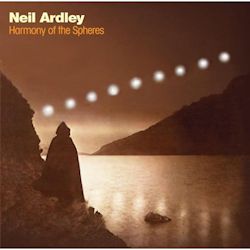 BUY NOW AmazonUK AmazonUS |
Neil Ardley Harmony of the Spheres
|
Upstarts All
Leap in the Dark
Glittering Circles
Fair Mirage
Soft Stillness and The Night
Headstrong, Headlong
Towards Tranquility
Neil Ardley and orchestra
Recorded July to September 1978, Morgan Studios, London
Neil Ardley’s Harmony of the Spheres was recorded in London in 1978. It came soon after his participation in the ground-breaking jazz rock album Kaleidoscope of the Rainbows alongside Ian Carr, Nucleus and heavyweight practitioners like Tony Coe and Barbara Thompson. Harmony was released on Decca in 1979 and was Ardley’s last recorded work on a major label. It’s a concept album concerned with the celestial music the Ancient Greeks believed emitted by the planets. To help him evoke the sounds and the concept behind them Ardley enlisted many of the musicians with whom he had worked so closely – Carr, Coe and Thompson prominent among them along with luminaries of the British and European scene such as Norma Winstone, Trevor Tomkins, and Geoff Castle as well as the unlikely-seeming John Martyn. Martyn, though known to many as a folk musician, was actively involved with jazz musicians at this time and worked with the explosive talent of John Stevens, whose muse was altogether saltier than Ardley’s.
Jazz-Rock, motored by funky bass lines, fuses with synthesised richness in this album. Elements of the ethereal also infuse Upstarts All whereas in Leap in the Dark it’s Ex-Nucleus Bill Kristian whose fast fret work on the bass guitar gives its very personal character; here one can also hear the evocative duetting of Coe and Thompson’s soprano saxes. John Martyn contributes evocative colours, not least on Glittering Circles, where the music is full of space and contour – an astral vista without doubt with music of the spheres to match. Up-tempo, Fair Mirage shows how vivid Ardley’s synthesizer could be and how well he fused these sounds with those of the saxes, especially in their upper registers and where Norma Winstone’s own exceptional vocal contributions can be appreciated.
There’s a curious, compelling moment in Soft Stillness & The Night where Ardley’s synth work takes on an ecclesiastical element amidst the cosmic, a stillness and reflective intimacy amidst the funk, before the pyrotechnical funkiness of Headstrong, Headlong brings Barbara Thompson’s flute and Ian Carr’s wa-wa trumpet over funk bass and drums. A full quotient of jazz-folk-rock is duly unleashed. Finally, in Towards Tranquility Carr and Winstone combine with eerie transcendence, wordlessly cosmic, cohabiting with the synth’s own ‘voice’ and Martyn’s deft styling, finally to meet the celestial spheres.
Obviously, the vogue for this kind of thing has long passed. Lovers of the more straight-ahead virtues of the then fairly recently departed Tubby Hayes, say, will have little truck with the more viscous pleasures of an album such as this. Hayes’ fire and brimstone was a world away from the alt-prog-funk-folk-jazz explored more amorphously here. But each to his own. This album, excellently remastered, casts a real spell and in Ardley British Jazz had an experimenter of true vision, whether celestial or more earthbound.
Jonathan Woolf